At last year’s Taipei International Jazz Festival, the audience witnessed firsthand the essence of jazz.
It was a typically hot and humid summer night at Da-an Forest Park (大安森林公園), and Dutch trumpeter Saskia Laroo had just begun her set when a power outage struck. The outdoor amphitheater went dark, and the stage crew scrambled to get the sound system working, but to no avail.
Laroo ditched the microphones. She walked out into the audience and started playing. Soon enough, the other musicians came down from the stage with their horns and joined in. The crowd erupted into cheers, and started to dance and clap along. A parade formed, with the musicians leading the way.
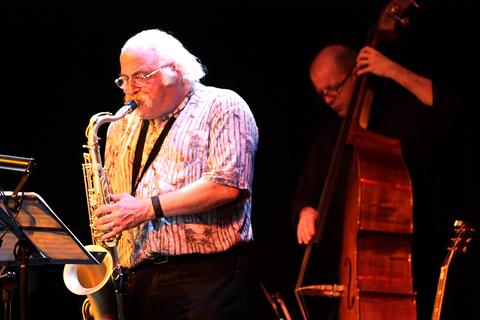
“You could call that jazz improvisation,” chuckled Hsieh Chi-pin (謝啟彬), a jazz violinist and one of the founders of the festival. Now in its fifth year, the festival has expanded from one weekend in its first year into six weekends of live jazz performances at various venues in Taipei, and launches tomorrow at the Beitou Hot Springs Museum (北投溫泉博物館).
After that evening, Hsieh and his co-organizers received calls from Taipei arts organizations asking for “advice” on how to hold “such exciting performances.” Many thought the power outage was planned as part of the event, he said.
“But believe me,” Hsieh said an interview earlier this week, “we don’t want any power outages this year — the improvised excitement of this year’s festival will be exclusively in the music.”
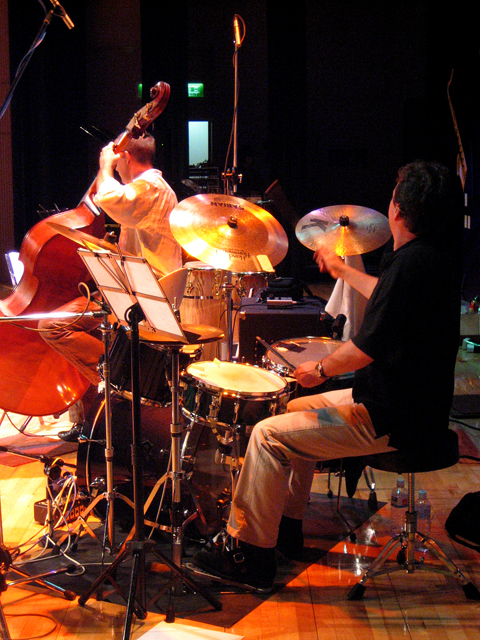
Besides, Hsieh is concentrating on a bigger ambition —helping Taipei’s blossoming jazz scene mature. In addition to the festival, he and his wife, pianist Chang Kai-ya (張凱雅), have seen enrolment increase by more than double at the Taipei International Summer Jazz Academy (TISJA), a one-week summer camp they founded in 2004.
The TISJA, which coincides with the festival, has helped to cultivate local groups, and many of the performers at this year’s festival are returning students from the camp. Gary “the Tunafish” Tan (陳凌鶴) is a relative newcomer to jazz, having started just six years ago. He says that from his experience, TISJA enables people in Taiwan to “get a good jazz education.”
The 38-year-old already has his own group, the Tunafish Jazz Quartet (鮪魚爵士四重奏), which plays at the festival tomorrow (see the schedule for details). Tan was inspired to learn jazz after watching Chang play at the Blue Note (藍調) in Taipei. He had studied classical piano as a child, but the way Chang played fascinated him. “I became curious how to generate those sounds,” he said.
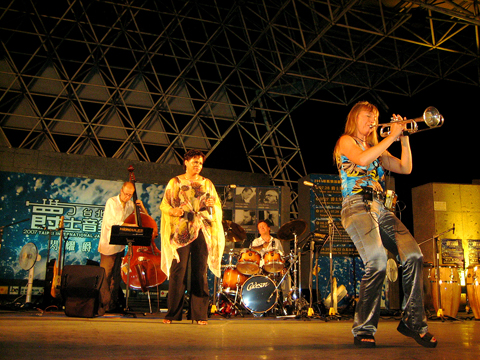
The camp “helped me to pick up [a lot of skills] within a very short time,” said Tan. It also gave him performance experience, which is an important part of TISJA, in addition to theory and technique.
Tan, who is the Vice President of Polaris Securities Co (寶來證券), recalls his first experience on stage: “I felt more nervous than I did when doing trading.”
But jazz continues to be a labor of love for Tan — although his work and family keeps him busy, he gigs whenever he can with his band, which plays jazz standards and some Latin numbers.
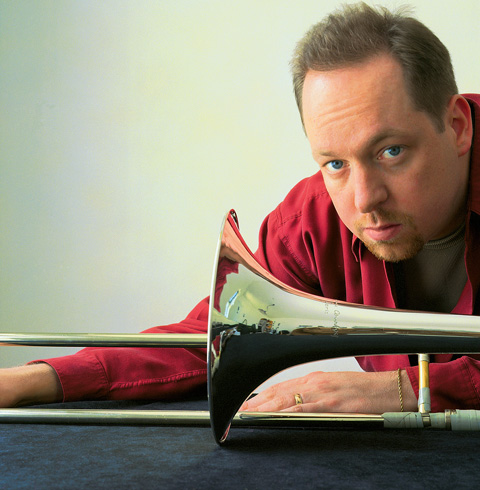
Another rising star in Taipei’s jazz scene is Gin Lin (林華勁), who also studied at TISJA and performs in the festival on July 5. The 26-year-old guitarist says he was inspired by one of the TISJA instructors, US saxophonist John Ruocco: “He said if jazz is the only thing you are passionate about, then don’t hesitate to do it. I decided to devote myself [to this music].”
Tan and Lin are success stories in Taiwan’s jazz scene, says Hsieh, who believes that nurturing local talent is just as important as bringing in big name performers.
TISJA is also attracting more students from outside of Taiwan, mostly from Japan and Hong Kong, but there has also been interest from Australia and the US, says Hsieh. One appeal of the camp, he says, is the faculty, which includes Laroo and Ruocco, as well as trombonist Steve Davis and vocalist Denise Jannah, among other musicians from Europe and the US. The faculty members are the featured performers for the festival’s final concerts, which takes place on July 25 and 26.
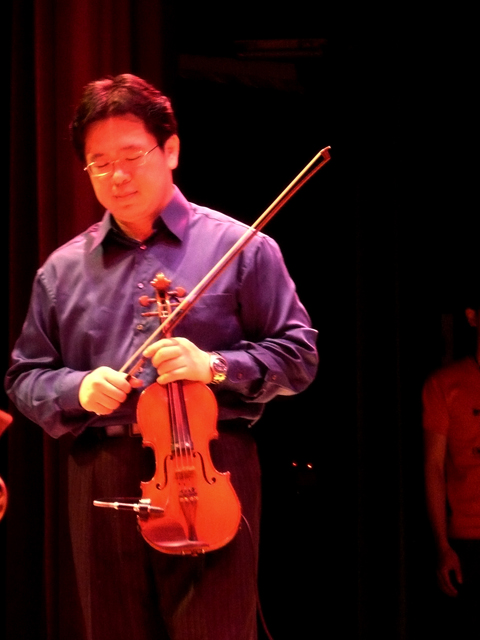
And the camp reaches beyond its summer session — TISJA alumni meet monthly for informal jam sessions to keep their chops up, said Hsieh.
Hsieh hopes that someday finding jazz music in Taipei will be as easy as “turning on the TV.” But he doesn’t feel that Taipei needs to overtake Tokyo or Bangkok as the “jazz capital of Asia.” Hsieh does hope, however, that Taipei’s jazz scene can develop to the point where “musicians can make a living” from playing.
For Hsieh, jazz has grown beyond its inception as a uniquely American art form. It is also something local, and everyone should experience “real life jazz in the city where you live,” he said.
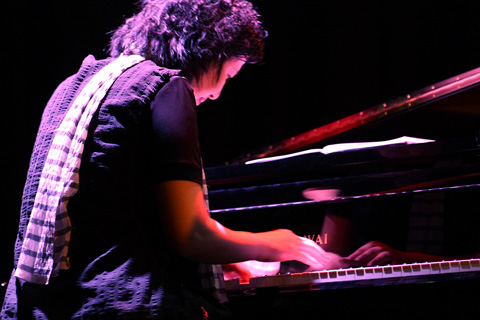
FESTIVAL NOTES:
WHAT: Taipei International Jazz Festival
WHEN: Starts tomorrow, with concerts every Saturday until July 19; Festival Finale on July 25 and June 26
Where: Various locations in Taipei (see schedule)
Details: All concerts are free
On the Net: www.taipeijazz.com
Schedule and Venues
All shows, except finale, on every Saturday, beginning at 6:30pm, until July 19
JUNE 21
Vocalist Wu Ching and Ching-Tsung Quartet (歌手吳青與聰義爵士四重奏)
Jazz vocal standards backed by drums, bass, and piano
Tunafish Jazz Quartet (鮪魚爵士四重奏)
Group led by Gary “the Tunafish” Tan, playing standards and Latin jazz on piano, bass, drums, and guitar
Beitou Hot Springs Museum (北投溫泉博物館) at 2, Zhongshan Rd, Beitou Dist, Taipei City (台北市北投區中山路2號); near Xinbeitou MRT Station (新北投捷運站)
JUNE 28
Chung-li Jazz Trio (呂仲理爵士三重奏)
Piano jazz trio, inspired by the work of Bill Evans, Keith Jarrett, and Chick Corea
LOMO Jazz Quintet (LOMO爵士五重奏)
Easy-listening jazz standards played in an “elegant way.” The group is named after the camera brand for being inexpensive but of “high quality.”
Museum of Contemporary Art, Taipei, (台北當代藝術館), 39 Changan W Rd, Taipei City (台北市長安西路39號); near Zhongshan MRT Station (中山捷運站)
JULY 5
Random Taxi (台灣大學愛樂爵士樂團)
Bebop, cool, Latin and modern jazz played by members of National Taiwan University’s jazz music lovers club.
Gin Guitar Trio
Jazz trio led by guitarist Gin Lin (林華勁) playing standards, and striving to balance “rhythm, melody, and harmony.”
Taipei Water Park (台北自來水園區), 1 Siyuan St, Taipei City (台北市思源街1號); near Gongguan MRT Station (公館捷運站); for directions visit waterpark.twd.gov.tw/english/traffic.htm
JULY 12
Wish Project ’08
A quartet inspired by the 1993 jazz album “Wish,” by saxophonist Joshua Redman.
Brussel Van Taipeh
A Taiwanese quintet that studied jazz together in Belgium. With special guest bassist Kinya of Japan.
Outdoor square in front of Zhongshan Hall (台北市中山堂中正廳), 98 Yenping S Rd, Taipei City (台北市延平南路98號); near Ximen MRT Station (西門捷運站), Exit No. 5
JULY 19
Hope & Gin’s Guitar Duo featuring Wei-jiun
Trio of two guitars and violin featuring Hope Yeh (葉賀�?Gin Lin (林華勁), and Huang Wei-jiun (黃偉駿).
Jazz for Lovers — Vocalist Ya-wen & OFF Trio (爵士情人夢—歌手孫雅文與OFF三重奏 )
Quintet led by female vocalist Sun Ya-wen (孫雅文)
Taipei Fine Arts Museum (臺北市立美術館), 181, Zhongshan N Rd Sec 3, Taipei City (台北市中山北路3段181號); near Yuanshan MRT Station (圓山捷運站); (02) 2595 7656
FESTIVAL FINALE
JULY 25 AND JULY 26
FROM 7:30PM TO 9:30PM
FEATURED PERFORMERS
Steve Davis (USA): Trombone
David Milne (USA): Saxophone
John Ruocco (USA): Saxophone, clarinet, flute
Bart de Nolf (Belgium): Double bass, electric bass
Fabien Degryse (Belgium): Guitar
Thierry Gutmann (Belgium): Drums
Peter van Marle (Netherlands): Piano, percussion
Saskia Laroo (Netherlands): Trumpet
Denise Jannah (Netherlands): Vocals
Chi-pin Hsieh (Taiwan): Violin
Kai-ya Chang (Taiwan): Piano
At 228 Peace Park (228和平紀念公園), Main Stage, near NTU Hospital MRT Station (台大醫院捷運站), exit No. 1
Young Talents Jazz Concert Series
Many of the festivals participants in this year’s festival are also students of the Taipei International Summer Jazz Academy (TISJA). The following is a list of their additional performances at clubs and pubs around Taipei. There is an entrance fee of NT$400 for each of these shows.
JUNE 29, 2:30PM
Vocalist Wu Ching and Ching-Tsung Quartet (歌手吳青與聰義爵士四重奏)
Franz and Friends, 25, Bade Road Sec 3, Taipei City (台北市八德路三段25號B1)
JULY 2, 7:30PM
Jazz Piano Duet — Interactions between Kai-ya Chang and 3 Young Sensations (爵士雙鋼琴—張凱雅與三位新秀的激盪)
Shih Chien University Recital Hall (實踐大學音樂廳), 70 Dazhi Street, Taipei City (台北市大直街70號)
JULY 4, 7:30PM
LOMO Jazz Quintet (LOMO 爵士五重奏)
Nanhai Gallery, 3, Ln 19, Chongching S Rd Sec 2, Taipei (南海藝廊台北市中正區重慶南路二段19巷3號)
7/07 (MON), 9:30PM
Random Taxi (台灣大學愛樂爵士樂團)
Witch House, 7, Ln 56, Xinsheng S Road Sec 3, Taipei City (女巫店•台北市新生南路三段56巷7號)
JULY 11, 9:30PM
Brussel Van Taipeh
Riverside Cafe, B1, 2, Ln 244, Roosevelt Rd Sec 3, Taipei City (河岸留言•台北市羅斯福路三段244巷2號B1)
JULY 14, 9:30PM
Wish Project ’08
Blue Note, 4F, 171, Roosevelt Rd Sec 3, Taipei City (藍調•台北市羅斯福路三段171號4樓)
JULY 18, 9:30PM
Sam’s Jazz Quintet (蘇聖育爵士五重奏 )
Sappho de Base, 1, Ln 102, Anhe Rd Sec 2, Taipei City (台北市安和路二段102巷1號)

Exceptions to the rule are sometimes revealing. For a brief few years, there was an emerging ideological split between the Democratic Progressive Party (DPP) and Chinese Nationalist Party (KMT) that appeared to be pushing the DPP in a direction that would be considered more liberal, and the KMT more conservative. In the previous column, “The KMT-DPP’s bureaucrat-led developmental state” (Dec. 11, page 12), we examined how Taiwan’s democratic system developed, and how both the two main parties largely accepted a similar consensus on how Taiwan should be run domestically and did not split along the left-right lines more familiar in

As I finally slid into the warm embrace of the hot, clifftop pool, it was a serene moment of reflection. The sound of the river reflected off the cave walls, the white of our camping lights reflected off the dark, shimmering surface of the water, and I reflected on how fortunate I was to be here. After all, the beautiful walk through narrow canyons that had brought us here had been inaccessible for five years — and will be again soon. The day had started at the Huisun Forest Area (惠蓀林場), at the end of Nantou County Route 80, north and east

This month the government ordered a one-year block of Xiaohongshu (小紅書) or Rednote, a Chinese social media platform with more than 3 million users in Taiwan. The government pointed to widespread fraud activity on the platform, along with cybersecurity failures. Officials said that they had reached out to the company and asked it to change. However, they received no response. The pro-China parties, the Chinese Nationalist Party (KMT) and Taiwan People’s Party (TPP), immediately swung into action, denouncing the ban as an attack on free speech. This “free speech” claim was then echoed by the People’s Republic of China (PRC),

Specialty sandwiches loaded with the contents of an entire charcuterie board, overflowing with sauces, creams and all manner of creative add-ons, is perhaps one of the biggest global food trends of this year. From London to New York, lines form down the block for mortadella, burrata, pistachio and more stuffed between slices of fresh sourdough, rye or focaccia. To try the trend in Taipei, Munchies Mafia is for sure the spot — could this be the best sandwich in town? Carlos from Spain and Sergio from Mexico opened this spot just seven months ago. The two met working in the